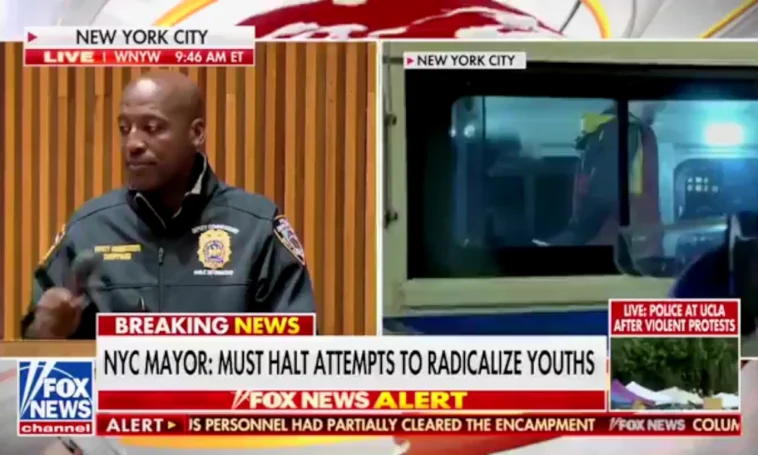Eric Adams Claims Columbia Anti-Israel Protest Was Co-Opted, Authorities Saw ‘Evidence Of Training’. After NYPD officers cleared Hamilton Hall on Columbia’s campus, Adams stated that efforts were made to differentiate between students and unauthorized individuals. He emphasized evidence of training among the protesters, indicating professional influence in radicalizing youth.
Adams said in a press conference that authorities were attempting to “distinguish between who were actually students and who were not supposed to be on the grounds.”
NYPD Deputy Commissioner Tarik Sheppard noted the use of chains, not typical of student supplies, suggesting outside involvement in the protest’s organization.
The protest, ongoing for nearly two weeks, demanded Columbia’s divestment from Israel amid the conflict with Hamas. Demonstrators set up tents on the Ivy League school’s grounds, calling for action against Israel. The escalating tensions led to the NYPD’s intervention, resulting in the arrest of dozens of protesters.
Mayor Adams voiced concern over the influence of external forces in radicalizing youth, calling it a “global problem.” He vowed to prevent such influence from taking hold in New York City, emphasizing the need to safeguard the city’s youth from radical ideologies. Adams highlighted the importance of distinguishing between genuine student activism and orchestrated protests driven by outside actors.
Deputy Commissioner Sheppard’s remarks underscored the sophisticated nature of the protest’s organization. The use of chains and barricades, typically not seen in student-led protests, pointed to a level of planning and coordination beyond what students would typically engage in. This revelation raises questions about the extent of external influence in orchestrating such demonstrations.
The protest at Columbia University is part of a larger trend of activism on college campuses, particularly regarding the Israeli-Palestinian conflict. Similar demonstrations have occurred at universities across the United States, reflecting growing tensions and divergent viewpoints on the issue. The involvement of external actors in shaping these protests highlights the complexity of the situation and the need for nuanced approaches to address it.
In response to the protest, Columbia University has reiterated its commitment to free expression while also emphasizing the importance of maintaining a safe and inclusive campus environment. The university condemned the occupation of Hamilton Hall and expressed support for the NYPD’s efforts to restore order.
The arrest of protesters at Columbia University and City College reflects the challenges faced by authorities in managing large-scale demonstrations. The charges against those arrested range from trespassing to burglary, underscoring the seriousness with which law enforcement is treating the situation. The arrests also serve as a deterrent against future attempts to disrupt campus activities through illegal means.
Moving forward, Mayor Adams and city officials are likely to closely monitor the situation to prevent further escalations. Efforts may be made to engage with student groups and community leaders to address underlying grievances and promote constructive dialogue. At the same time, measures to enhance campus security and prevent unauthorized access to university buildings may be implemented to prevent similar incidents in the future.
Overall, the anti-Israel protest at Columbia University has sparked debate and raised important questions about the role of external actors in shaping campus activism. It serves as a reminder of the complexities involved in addressing contentious issues and the need for collaborative efforts to promote understanding and tolerance in diverse communities.






One Comment
Leave a ReplyOne Ping
Pingback:Eric Adams Shows Support for America: Offering Reward for Information on Vandals of World War I Memorial - Hard Knock News
Join the Community and Be a Part of the Conversation
You must be logged in or registered to post a comment.